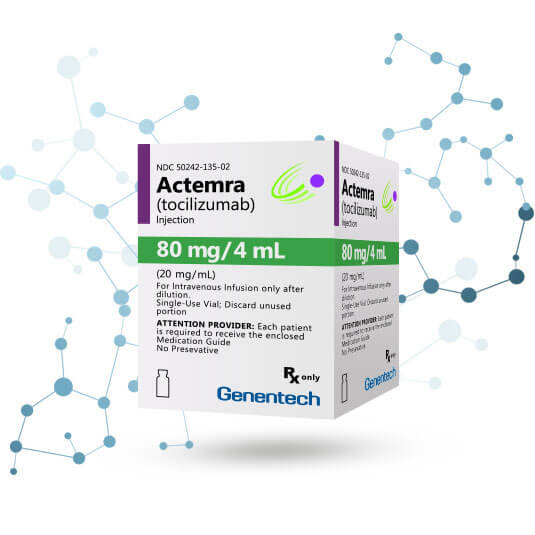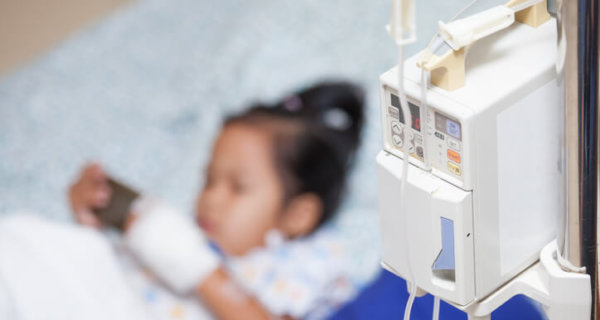Actemra Lawsuit Overview
 Rheumatoid arthritis is an autoimmune disorder affecting more than 1.3 million Americans. Until recently, common RA treatments included oral steroids (like prednisone) or tumor necrosis factor inhibitors (TNFis). While TNFis like Humira, Enbrel and Remicade dominated the RA drug market for years, they carried serious heart and stroke risks. GI perforation injuries, which aren’t easy to detect, were another concern for RA patients. As a result, pharmaceutical companies raced to develop newer treatment options called biologics that treated the source, not just symptoms. Roche brought its first patented biologic immunosuppressant drug, Actemra, to market in 2010.
Rheumatoid arthritis is an autoimmune disorder affecting more than 1.3 million Americans. Until recently, common RA treatments included oral steroids (like prednisone) or tumor necrosis factor inhibitors (TNFis). While TNFis like Humira, Enbrel and Remicade dominated the RA drug market for years, they carried serious heart and stroke risks. GI perforation injuries, which aren’t easy to detect, were another concern for RA patients. As a result, pharmaceutical companies raced to develop newer treatment options called biologics that treated the source, not just symptoms. Roche brought its first patented biologic immunosuppressant drug, Actemra, to market in 2010.
Since then, STAT News conducted an in-depth review of 500,000 rheumatoid arthritis drug adverse events reported in the FDA’s database. Shockingly, they found that 1,128 patients died shortly after taking Actemra. Hundreds more suffered GI perforation injuries, lung disease, heart failure and acute pancreatitis. As a result, Actemra product liability litigation is now underway.
What Is Actemra?
Actemra (tocilizumab) is the first biological therapy drug that’s FDA-approved to treat rheumatoid arthritis and giant cell arteritis (GCA). It belongs to a drug category known as IL-6 inhibitors, which block excess interleukin protein production within the body. Biologists found that too much interleukin protein significantly increases blood vessel and joint inflammation. So, they created IL-6 inhibitor drugs to treat rheumatic inflammation in patients that don’t respond well to Humira, Enbrel or Remicade.
After winning initial FDA approval in 2010, Roche, Actemra’s manufacturer, petitioned to expand tocilizumab’s use for other chronic inflammatory conditions. The agency’s newest 2012 FDASIA law fast-tracks drug reviews and approvals within 60 days of requesting “breakthrough therapy” designation. Roche saw an opportunity to expand its blockbuster RA drug’s market share, driving $1.7 billion in sales just for 2016.
Serious Actemra Side Effect Reports More Than Doubled In Japanese Clinical Trials
In post-market clinical trials involving 4009 participants, 253 died shortly after tocilizumab administration, mostly due to serious infections. That trial also showed 15.2% of subjects experienced “serious adverse events” globally, when averaged. What stands out within this 2015 summary report is the fact that 37.5% of Japanese subjects reported multiple adverse events. Why did Japanese clinical trial participants have significantly higher side effect rates than other countries reported? The review’s author attributes this marked difference to much stricter reporting rules required for Japanese medical registries. By contrast, researchers used global sales data and self-reporting methods to determine American and Canadian severe adverse event rates.
FDA Deems Newest IL-6 Inhibitor Drug “Not Safe Enough” for U.S. Market Approval
Competition grew fierce earlier this year as other companies struggled to gain FDA approval for their own patented IL-6 inhibitors. In May 2017, the FDA approved Sanofi’s IL-6 inhibitor called Kevzara (sarilumab) to treat moderate to severe RA in adults. But on August 2, 2017, the FDA’s Arthritis Advisory Committee (AAC) voted against approving Johnson & Johnson’s IL-6 inhibitor, sirukumab. Interestingly, all but one person on the 13-member panel voted “against the data being adequate to support the safety of sirukumab for the requested indication.” The exact same voting pattern prevented sirukumab from gaining FDA approval, despite the committee voting unanimously on the drug’s efficacy.
This begs the question: What safety issues changed the panel’s mind between approving Kevzara in May and the sirukumab vote? According to the new drug’s clinical trial data, “As seen with other IL-6 agents, SIR patients demonstrated increased numbers of patients with neutropenia, thrombocytopenia, hyperlipidemia and increased hepatic enzymes (in 44-58%).” If this latest drug has similar complication rates as other IL-6 inhibitors like Actemra, just how safe are these medications?
Alleged Misleading Drug Marketing Claims Cost Roche Millions In 2016
Together with OSI, Roche’s subsidiary company, Genentech, agreed to settle allegations over False Claims Act violations regarding Tarceva in 2016. According to the U.S. Department of Justice, the companies “exaggerated” cancer drug Tarceva’s efficacy for treating non-small cell lung cancer. (In fact, Tarceva only effectively treats patients who never smoked or have a rare genetic mutation.) OSI and Genentech paid $67 million to resolve those federal charges.
Roche is currently embroiled in a billion-dollar marketing battle against another global competitor, Shire, over emicizumab vs. FEIBA clinical trials. According to court documents, Shire says Roche “unlawfully disparaged” their drug, FEIBA, through “incomplete and misleading” adverse event statements. Roche allegedly sought to poach part of the hemophilia drug market share from Shire in its latest head-to-head drug trial.
Current Actemra Lawsuit Climate
Since STAT News just published its investigation results in June, Actemra litigation is still in the very early stages. However, countless product liability and wrongful death claims are sure to follow. Current allegations include failure to warn consumers about potentially deadly side effect risks. To date, Roche still hasn’t updated Actemra’s warning label to reflect heart, lung, GI tract and pancreas injury risks. As a result, deaths in Actemra patients with known risk factors for undisclosed complications may constitute negligence on Roche’s part.
Check eligibility for compensation.
If you or a loved one experienced GI perforation, pancreatitis, interstitial lung disease or heart damage while taking Actemra, you may be entitled to compensation from the manufacturer. Request your free case evaluation now to see if you may qualify.
Lori Polemenakos is Director of Consumer Content and SEO strategist for LeadingResponse, a legal marketing company. An award-winning journalist, writer and editor based in Dallas, Texas, she's produced articles for major brands such as Match.com, Yahoo!, MSN, AOL, Xfinity, Mail.com, and edited several published books. Since 2016, she's published hundreds of articles about Social Security disability, workers' compensation, veterans' benefits, personal injury, mass tort, auto accident claims, bankruptcy, employment law and other related legal issues.



